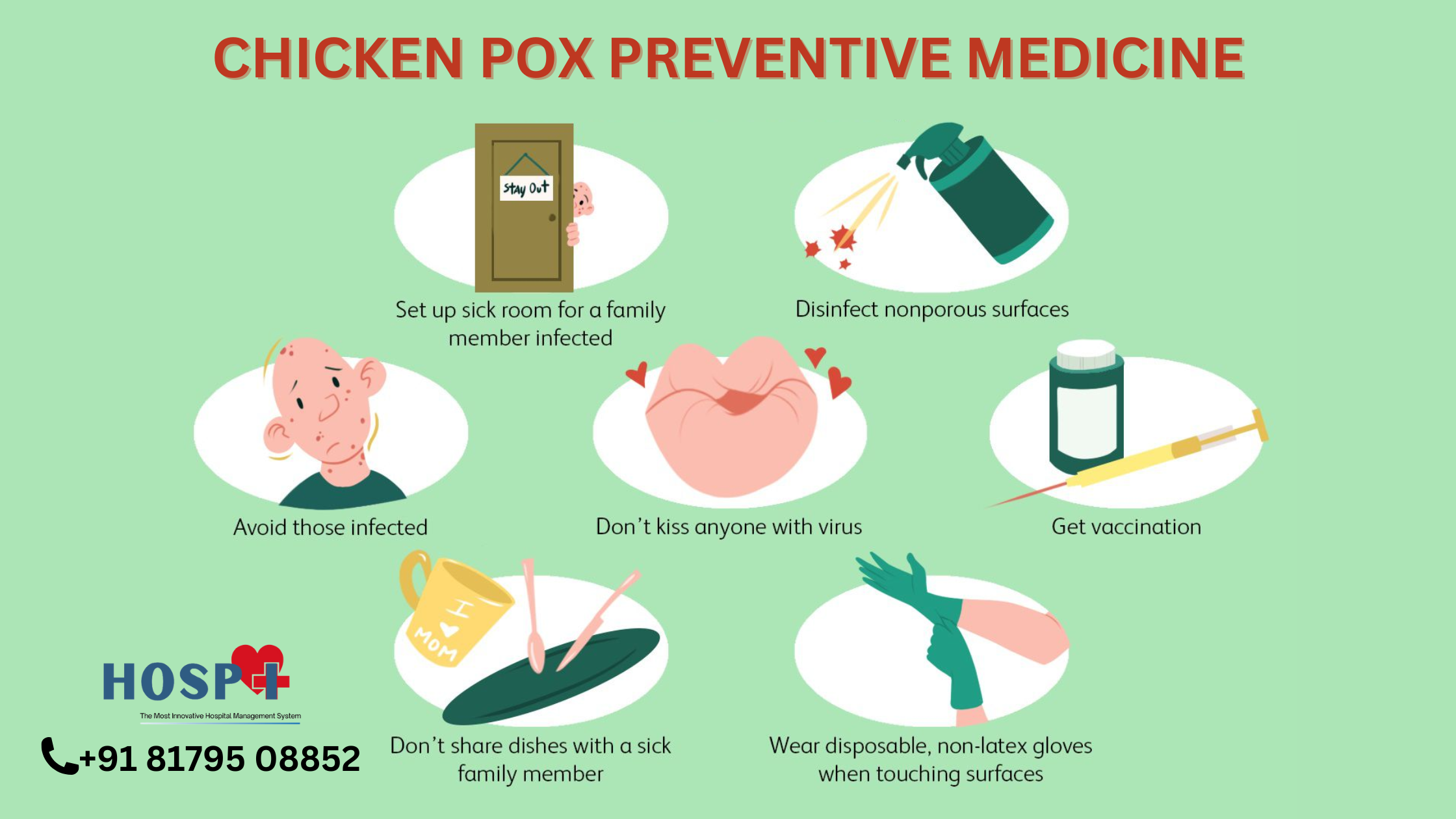Looking to modernize your Hospital, Lab or Clinic?
Hospi is trusted across 25 Indian states for billing, EMR, lab reports, automations & more.
Chickenpox, recognized as varicella, is an extremely transmissible viral ailment predominantly impacting children. It is characterized by an itchy rash, blister-like lesions, and flu-like symptoms. While chickenpox is usually a mild illness, it can cause complications, especially in adults and individuals with weakened immune systems. Fortunately, preventive medicine plays a crucial role in protecting against this infectious disease. In this article, we will explore various preventive measures and medications available to minimize the risk of chickenpox.
Table of Contents
1. Understanding Chickenpox: Causes and Symptoms
2. Importance of Chickenpox Prevention
3. Vaccination: The Key to Prevention
4. Chickenpox Vaccine Types
– Varicella Vaccine
– Combination Vaccines
5. Vaccination Schedule and Dosage
6. Effectiveness and Safety of Chickenpox Vaccines
7. Varicella Immunoglobulin: An Alternative Preventive Option
8. Preventive Measures for Chickenpox
– Maintaining Good Hygiene
– Isolation and Quarantine
– Avoiding Close Contact
9. Chickenpox in High-Risk Individuals
10. Managing Chickenpox Outbreaks
11. Chickenpox Prevention in Adults
12. The Role of Antiviral Medications
13. Natural Remedies and Homeopathic Approaches
14. Frequently Asked Questions (FAQs)
15. Conclusion
16. Get Access Now: [https://bit.ly/J_Umma](https://bit.ly/J_Umma)
1. Understanding Chickenpox: Causes and Symptoms
Chickenpox is caused by the varicella-zoster virus (VZV), which is highly contagious and can be transmitted through respiratory droplets or direct contact with the fluid from chickenpox blisters. The typical symptoms include an itchy rash, fever, fatigue, and loss of appetite.
2. Importance of Chickenpox Prevention
Prevention is crucial when it comes to chickenpox, as it can lead to severe complications such as bacterial skin infections, pneumonia, and encephalitis. By implementing preventive measures and utilizing available medications, we can significantly reduce the incidence and impact of chickenpox.
3. Vaccination: The Key to Prevention
Immunization is the most efficient method for preventing chickenpox. The chickenpox vaccine stimulates the immune system to produce antibodies that protect against the virus. It provides long-lasting immunity and significantly reduces the risk of contracting the disease.
4. Chickenpox Vaccine Types
There are two primary types of chickenpox vaccines available:
Varicella Vaccine
The varicella vaccine is a live attenuated vaccine that contains weakened VZV. It is administered through a subcutaneous injection and is recommended for individuals aged 12 months and older.
Combination Vaccines
Combination vaccines, such as the measles, mumps, rubella, and varicella (MMRV) vaccine, provide protection against multiple diseases. The MMRV vaccine is typically administered to children between 12 and 15 months of age.
5. Vaccination Schedule and Dosage
The initial vaccination is typically administered to children aged between 12 and 15 months, and the subsequent dose is given when they reach 4 to 6 years old. For adolescents and adults who have not received the vaccine, a catch-up vaccination may be recommended.
6. Effectiveness and Safety of Chickenpox Vaccines
Chickenpox vaccines have proven to be highly effective in preventing the disease. Studies have shown that vaccinated individuals who do contract chickenpox experience milder symptoms and a quicker recovery. The vaccines are generally safe, with only mild side effects such as soreness at the injection site or a low-grade fever.
7. Varicella Immunoglobulin: An Alternative Preventive Option
Varicella immunoglobulin (VZIG) is a medication containing antibodies against VZV. It can be administered to individuals who are at high risk of severe complications from chickenpox, such as pregnant women, newborns, and immunocompromised individuals.
8. Preventive Measures for Chickenpox
In addition to vaccination, certain preventive measures can help reduce the risk of chickenpox transmission:
Maintaining Good Hygiene
Regular handwashing with soap and water is essential to prevent the spread of the virus. Individuals should also avoid touching their face and mouth with unwashed hands.
Isolation and Quarantine
Infected individuals should be isolated to prevent the spread of chickenpox. Additionally, individuals who have been exposed to the virus may need to be quarantined to prevent further transmission.
Avoiding Close Contact
It is important to avoid close contact with individuals who have active chickenpox or shingles to minimize the risk of infection.
9. Chickenpox in High-Risk Individuals
Certain individuals, such as pregnant women, newborns, and those with weakened immune systems, are at higher risk of severe complications from chickenpox. It is crucial to take extra precautions and consult with healthcare professionals to protect these vulnerable populations.
10. Managing Chickenpox Outbreaks
In the event of a chickenpox outbreak, prompt measures should be taken to contain the spread of the virus. This may include school or workplace closures, thorough cleaning of affected areas, and public health interventions.
11. Chickenpox Prevention in Adults
Adults who have never had chickenpox or received the vaccine should consider getting vaccinated. Immunity can decrease over time, and contracting chickenpox as an adult can lead to more severe symptoms.
12. The Role of Antiviral Medications
Antiviral medications, such as acyclovir, can be used to treat chickenpox and reduce the severity of symptoms. These medications are most effective when started within 24 to 48 hours of the rash onset.
13. Natural Remedies and Homeopathic Approaches
While there are various natural remedies and homeopathic approaches suggested for chickenpox symptom relief, it is important to consult with a healthcare professional before using any alternative treatments. These remedies may provide relief from itching and discomfort but should not replace medical advice or prescribed treatments.
## Frequently Asked Questions (FAQs)
1. Can adults get chickenpox?
2. How long is the incubation period for chickenpox?
3. Are chickenpox vaccines safe during pregnancy?
4. Can you get chickenpox more than once?
5. Are there any long-term complications of chickenpox?
Conclusion
Preventing chickenpox is essential to protect individuals from this highly contagious virus. Vaccination, good hygiene practices, and preventive measures play vital roles in reducing the risk of infection. By taking proactive steps, we can safeguard ourselves and our communities from the itchy culprit that is chickenpox.
Want a quick walkthrough of Hospi?
We offer gentle, no-pressure demos for hospitals, labs & clinics.
Or call us directly: +91 8179508852


